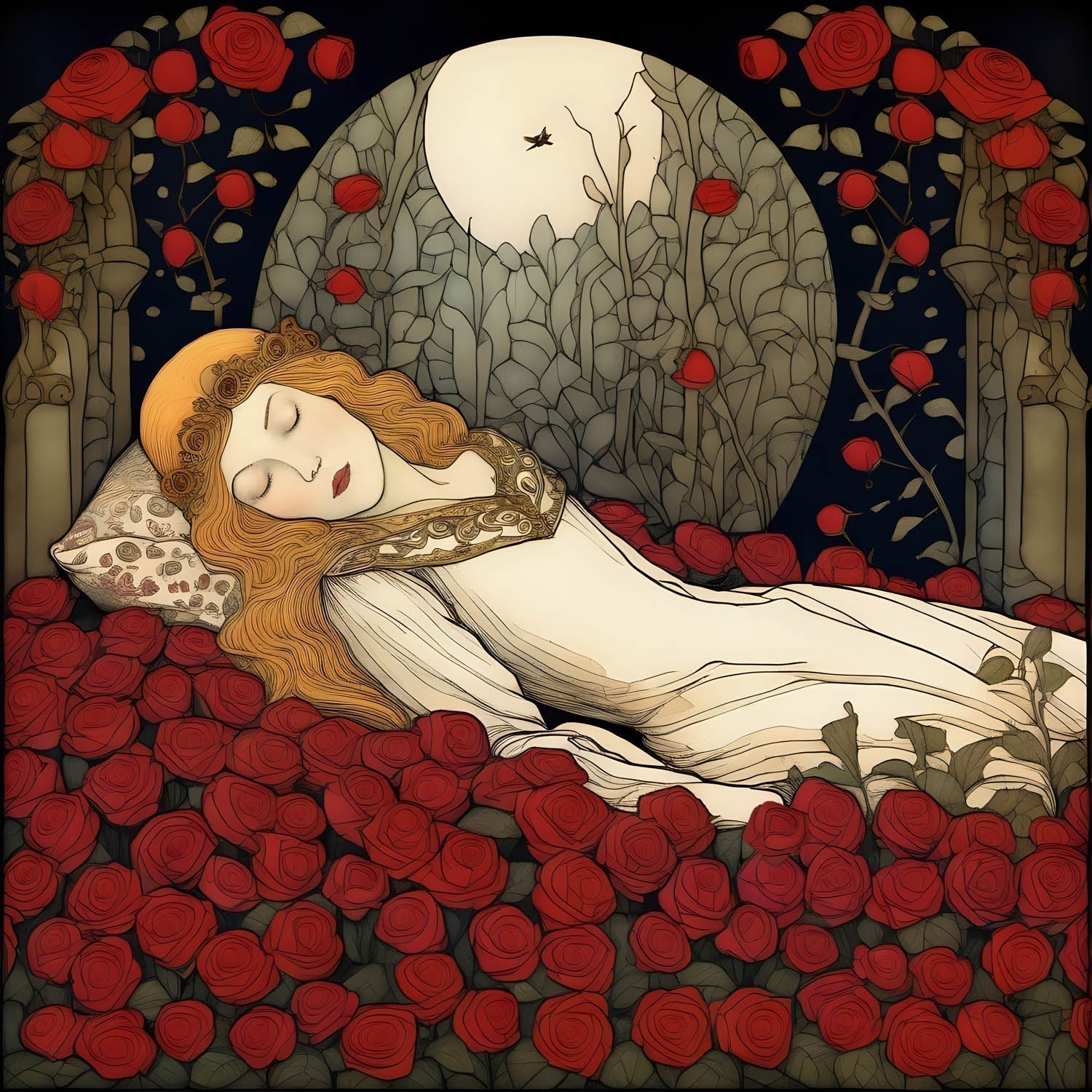Aurora ·
Aurora borealis ·
Aurora's Chamber ·
Eos ·
Gold ·
Little Briar Rose ·
Northern Lights ·
Rose ·
Roses ·
Sleeping Beauty ·
Tower ·
Aurora - What's in a name?

Image by Louise Nevander 2024.
"What's in a name?"
Aurora is the princess who pricks her finger and sleeps for a hundred years. The number of versions of this fairytale is as many as the number of narrators. The Disney version gave the princess the name Aurora, but Tchaikovsky also named the princess Aurora in his 1889 ballet Sleeping Beauty. The name was also given to one of the princess's daughters in the version of the tale found in Mother Goose, written by the Frenchman Perrault - the princess herself had no name in this story.
In many versions of the tale, the princess - let's call her Aurora - is cursed by an evil fairy: she will die after pricking her finger on something related to spinning, either on a spinning wheel or on a needle from a piece of flax she is trying to spin (flax, the seeds of which are said to be an excellent remedy for drawing foreign substances out of skin). Despite the king's gracious attempts to allow the princess to escape her fate, primarily by burning all spinning wheels and banning all spinning, but perhaps also by locking her up in a tower, the princess pricks her finger. She sleeps for a hundred years, only to be awakened by a prince - when this happens differs between different versions - sometimes she wakes up as soon as the prince kneels down next to her, in another version the prince's kiss wakes her up, in yet another she has time to have a child with the prince before waking up from her beauty sleep...
But what does the princess's sleep actually represent? What happens while Aurora sleeps?
Before we think about that, I would like to say something more about the name Aurora itself, and where else it is found. The tale of the sleeping princess in the forest is not the only story where the heroine is named Aurora.
Aurora is also the name of the goddess of dawn in the Roman version of the Greek Eos, the goddess who fell in love with the hunter Orion. In Ovid's Metamorphoses, Aurora opens the red doors to fill her rosy halls, and in Nonnus' Dionysiaca, Aurora, the goddess of dawn, shakes off sleep and leaves Cephalus to rest to open the gates of sunrise.
However, the most interesting of Aurora's love stories in this context may be that of Aurora (or Eos) and Tithonus. Tithonus was an ordinary mortal, and would therefore grow old and die. Unable to accept the fate of her beloved Tithonus, Aurora prayed to Zeus to make him immortal. Zeus, in turn, for some reason decided to grant Aurora her wish. However,we are told that Aurora forgot to wish him eternally young, and the story ends with Aurora locking up Tithonus in a tower (a chamber, if you will) and throwing away the key. It reminds me of an old fairy tale...
Another phenomenon linked to the name Aurora, and so to the goddess of dawn above, is one of our most beautiful weather phenomena. Aurora borealis is the Latin name for the Northern Lights. Directly translated, Aurora borealis roughly means 'northern dawn'. The term is said to have been coined by Galileo in 1619, a combination of the name of our rose-fingered goddess Aurora and the ancient Greek name for the northern wind, Boreas (whose name appears in a variant as our King Bore, or King Winter).
Last but not least, the first two letters of Aurora stand for gold, Au. It is no coincidence that this is the case - the reconstructed Proto-Indo-European name for dawn, *h₂éwsōs (shine, glow red, flame), has the same root as the word for gold, *h₂ews-om (shine), which was inherited in the Latin aurum (gold), and which was later shortened to Au, as in Aurora. Not infrequently, the goddess Aurora was said to have golden arms and golden sandals (Sappho), or was simply described as golden or of gold (Ovid).
This is how Aurora's Chamber got its name, from Aurora, the princess of fairy tales and the goddess of myths; a golden chamber or treasure chamber of the North... or a burial chamber.








Leave a comment